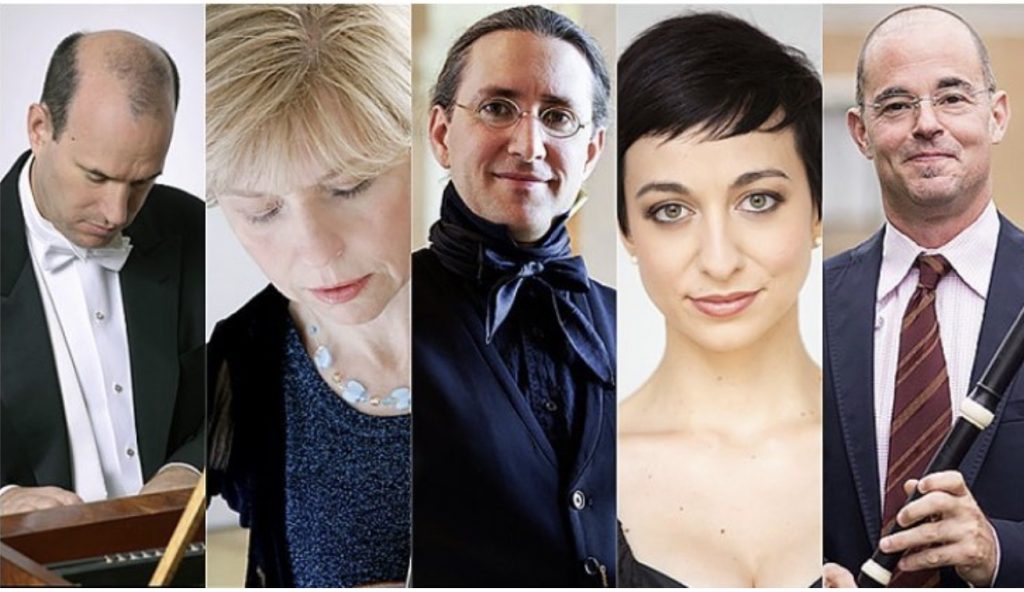Four Nations Ensemble Goes For Baroque
Early Music Now concert features works by Handel, Couperin, Rameau.
Early Music Now closes its season with a Baroque concert, Crossing Borders: Italian & French Masterworks. The concert features six members of Four Nations, a Baroque ensemble based in Hudson, New York: Artistic Director and harpsichordist Andrew Appel, violinists Olivier Brault and Chloe Fedor, cellist Keiran Campbell, lutenist Scott Pauley and soprano Pascale Beaudin.
By the late Baroque period in the first half of the 18th Century European national styles had developed and composers recognized and were influenced by each other. This concert explores patterns emerging in the French court and several Italian city-states.
La Folia, a dance theme thought to have emerged from Portugal in the fifteenth century, swept Spain as a standard chord progression played by guitars accompanying dancers. The melody line established by Arcangelo Corelli initiated a theme and variations in the early 1700s that highlighted virtuoso opportunities for the violin; The La Folia chord progression serves as a bass line to support the theme and variations. Corelli’s influence inspired many imitators, including Antonio Vivaldi, whose variations add energy through a more theatrical presentation. (Dozens of composers adopted the La Folia framework continuing into the 21st century.)
By contrast, French composer François Couperin built upon the chord progression but not the Corelli melody, creating a series of character studies instead. French composers often used the solo harpsichord to create images, employing compositional techniques that convey mood, emotion, and character in the music. Couperin’s skillful use of ornamentation, articulation, dynamics, and rhythmic patterns allowed him to imbue the music with distinct personality traits and qualities.
Couperin built upon the La Folia baseline a series of character studies, “Les Folies françoises, ou les Dominos,” depicting personages at a masquerade ball wearing masks representing virtues and vices. An entire collection of characters, Virginity, Modesty, Ardour, Hope, Fidelity, Perseverance, Coquetry, Cuckold, Jealousy, Frenzy are represented, progressing from innocent to sinister. For example, Le Virginite exudes a sense of purity, innocence, and simplicity. The piece is characterized by its gentle, flowing melody, delicate ornamentation, and graceful phrasing. In contrast, La Coquéterie embodies a lively, playful, and flirtatious character. The piece is marked by its spirited rhythms, lively dance-like quality, and exuberant ornamentation.
The piece unfolds with a sense of spontaneity and vivacity, reflecting Couperin’s ability to infuse his music with humor and wit. Frankly, today’s audiences are too accustomed to thinking of the harpsichord as a background instrument. Careful listening to this important work, played by Appel as a virtuoso harpsichordist, may be the concert’s highlight. Preview his recording here, or view this version that includes an introduction to the work and a full list of the sections.
Soprano Beaudin will be featured singing works by Jean-Philippe Rameau, Antonio Caldara, and George Frederick Handel. Appel says of Handel that, “Wherever he goes, he becomes a master of the style. He is able to write a perfect (French) Sarabande and a perfect Italian lament at the same time.” Listen here.
The Baroque period in music was characterized by a heightened expression of emotion and an emphasis on contrast and affect. Composers were drawn to themes of despair and melancholy because they offered rich opportunities to explore a wide range of emotional depths and intensities.
Appel commented on the mood of the French court:
Their entitlement allowed them so much sensual pleasure. Their music is so sensuous and so voluptuous and beautiful, and their lives, you know, in terms of their attitude towards taking pleasures out of life, they felt that they were entitled to all this pleasure. And they got it from their music, they got it from their food, and they got it from their art.
He referred to the poet Paul Verlaine‘s Clair de Lune:
Singing all the while, in the minor mode,
Of all-conquering love and life so kind to them
They do not seem to believe in their good fortune,
And their song mingles with the moonlight.
The Four Nations concert exemplifies the Early Music Now mission – to bring virtuoso players to Milwaukee who have researched and curated the best of early classical music.
The concert begins at 5:00 p.m. Saturday, May 18 at St. Paul’s Episcopal Church (914 E. Knapp St.) A pre-concert lecture will be offered at 4:00 p.m. Tickets with tiered seating are available online. Parking is available on the street or in the nearby Lincoln Center of the Arts school lot.
If you think stories like this are important, become a member of Urban Milwaukee and help support real, independent journalism. Plus you get some cool added benefits.
Preview
-
A Sacred Choir, 70 Voices Strong
 Dec 14th, 2025 by Martha Brown
Dec 14th, 2025 by Martha Brown
-
Prometheus Trio Goes Bohemian
 Dec 3rd, 2025 by Martha Brown
Dec 3rd, 2025 by Martha Brown
-
Present Music Offers New Choral Works
 Nov 20th, 2025 by Michael Barndt
Nov 20th, 2025 by Michael Barndt





















